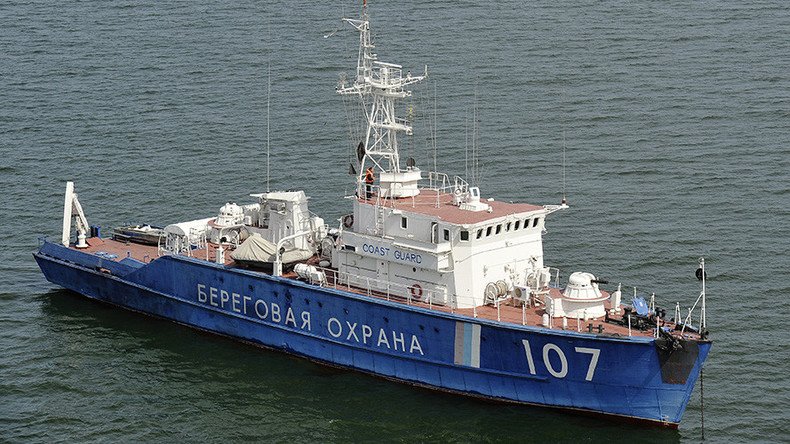Russian Navy chases off Turkish vessel impeding drill platform transit in Black Sea

A Russian missile cruiser and a coast guard powerboat had to intervene after a merchant vessel flying the Turkish flag blocked a convoy transporting two drill platforms to a new location in Moscow's territorial waters.
The decision to relocate them closer to Crimea was caused by the complicated international situation, according to a press release from the Russian Chernomorneftegaz state company which owns the platforms.
While the two rigs were being moved to their new location, a vessel under the Turkish flag crossed the convoy’s path.
“Acting in violation of regulations for preventing collisions and against the generally-accepted conventions of navigation, the Turkish vessel failed to get out of the way of the convoy. It approached crossways and attempted to stop its course, thus creating potential for a collision,” Chernomorneftegaz said in a statement, stressing that the captain of the Turkish vessel operated radio silence despite requests to respond.
READ MORE: Turkey decries sighting of Russian ‘soldier with manpad’ on ship passing Istanbul
The incident was “resolved” when a powerboat from the Russian coast guard and a missile cruiser came to the aid of the Russian convoy and chased the Turkish vessel off.
The company says the B-312 and B-319 rigs are worth 25 billion rubles (about US$357mn). Both rigs have reportedly being safely brought to Russian territorial waters.
It is the second recent sea incident involving the Russian Navy and Turkish vessels.
Russian destroyer fires warning shots at Turkish fishing boat on collision course in Aegean https://t.co/9nxx0PDu14pic.twitter.com/TGG8dCN9sO
— RT (@RT_com) December 13, 2015On December 13, a Russian warship had to fire warning shots at a Turkish trawler to prevent a collision in the Aegean Sea some 22 kilometers off the Greek island of Lemnos. The fishing boat was steering towards the Russian battleship and ignored all communications from the Russians.
The succession of the incidents involving Russian and Turkish ships is “an overture to the Turkish intention to raise the issue of renegotiating the Montreux Convention [regulating passage of the foreign ships through the Turkish straits of Bosporus and Dardanelles],” Professor Srdja Trifkovich, foreign affairs editor of the Chronicles Magazine, told RT.
Trifkovich explained, that the Montreux Convention (signed in 1936) is subject to renewal every 20 years, so in 2016 the convention will be re-signed.
“Obviously, this would be a handy time for the Turks to start raising tension and to start claiming that the number of incidents – for which they, of course, would blame the Russian side – indicates the need to impose some as yet unknown restrictions on the passage of the Russian warships through the straits,” Trifkovich said, stressing that in the past similar incidents were quite rare.
Trifkovich noted that an escalation in Russia-Turkey relations over the straits would be a major one, giving the fact that gaining access to the Bosporus and Dardanelles straits has been an imperative of Russian foreign policy since the 18th century.
The strait issue is particularly sensible now as Russia is conducting a counter-terrorist operation in Syria. The shortest sea route to Syria passes through the Bosporus and Dardanelles.












